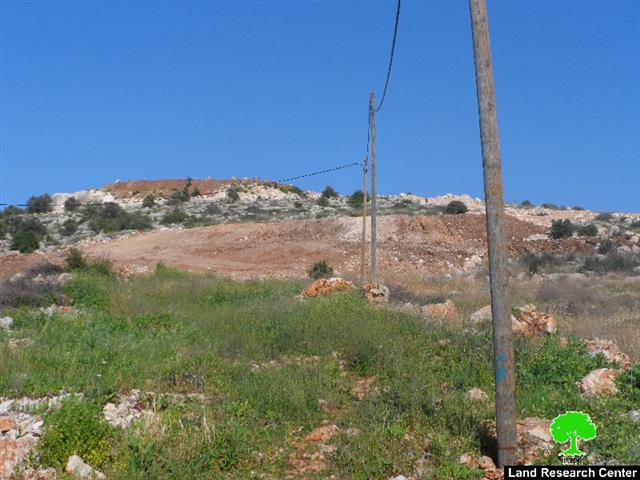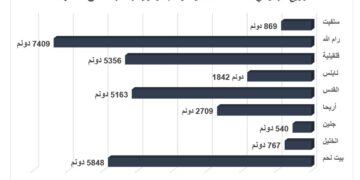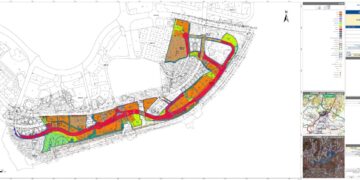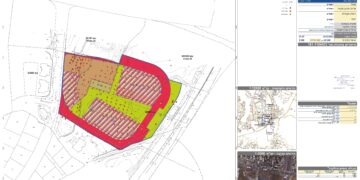- Violation: ravaging Palestinian lands
- Location: Deir Ballut village- Salfit
- Date: March 03, 2016
- Perpetrators: Israeli Occupation Forces
- Victims: four families
Details:
The colony of Leisham that is founded on lands from Deir Ballut village is witnessing new ravaging and construction works to accommodate and receive new colonists in the area.
It should be marked, and according to the field research, that the ravaging and construction works are focused in the western side of the colony, where a road was open and lands slope was modified for the construction of new residential units.
It is reported that an area of 34 dunums cultivated with olive trees was ravaged for that end.
The killing of 160 olive trees to build new colonial units:
It should be also marked that the ravaging and construction works caused 160 olive trees (aging 8 years each) to die in the process. The trees are reported to belong to the following farmers:
- Idris Abdallah (45 trees)
- Na'im Abdallah( 60 trees)
- Mohammad Abdallah (23 trees)
- Fahmi Abdallh (32 trees)
The abovementioned trees were planted for the sake of protecting the lands from colonization and takeover. The Israeli occupation is trying hard to take the lands over claiming them "state lands" to be later given for colonists to expand their colonies on.
Photos 1+3: side from the ravaging works
A theft in daytime:
It should be marked that farmers on March 12, 2014 managed, though attorney Bassam karajah, to obtain a decision from Israel Supreme Court that states the returning of lands for their owners in the area of Bab Al-Marj, west Deir Ballut village.
the court's decision
Despite all decisions made by Israeli Courts, the occupation forces keep on demolishing structures, ravaging lands and carrying out other violations and attacks on Palestinians and their properties. All Israeli measures and practices are done for the favor of colonization and its continuity.
Leisham colony devours the lands of Deir Ballut:
It should be marked that Leisham is an extension of Ali Zahav colony and is founded on lands from the towns of Kfar Ad-Dik and Deir Ballut. The lands were confiscated on the claim of "Security Purposes" in 2002.
In 2013, a plan for establishing a colonial neighborhood with the name Leisham was approved and ratified by the government. A bid for establishing 150 residential units followed that step. As a result, a new colonial quarter was added to the colony of Ali Zahav.
UN Security Council resolutions in regard to Israeli colonies:
UN Security Council resolution 446, article 3 " Calls once more upon Israel, as the occupying Power, to abide scrupulously by the 1949 Fourth Geneva Convention, to rescind its previous measures and to desist from taking any action which would result in changing the legal status and geographical nature and materially affecting the demographic composition of the Arab territories occupied since 1967, including Jerusalem, and, in particular, not to transfer parts of its own civilian population into the occupied Arab territories;"
- Un Security Council resolution 452, article 3"Calls upon the Government and people of Israel to cease, on an urgent basis, the establishment, construction and planning of settlements in the Arab territories occupied since 1967, including Jerusalem;"
- Un Security Council resolution 465, Strongly deplores the continuation and persistence of Israel in pursuing those policies and practices and calls upon the Government and people of Israel to rescind those measures, to dismantle the existing settlements and in particular to cease, on an urgent basis, the establishment, construction and planning of settlements in the Arab territories occupied since 1967, including Jerusalem;
Calls upon all States not to provide Israel with any assistance to be used specifically in connexion with settlements in the occupied territories;
- Un Security Council resolution 242, Affirms that the fulfilment of Charter principles requires the establishment of a just and lasting peace in the Middle East which should include the application of both the following principles:
(i) Withdrawal of Israel armed forces from territories occupied in the recent conflict;
(ii) Termination of all claims or states of belligerency and respect for and acknowledgment of the sovereignty, territorial integrity and political independence of every State in the area and their right to live in peace within secure and recognized boundaries free from threats or acts of force;
UN Security Council Resolution 242 of 1967: calls for
- the Withdrawal of Israel armed forces from territories occupied in the recent conflict;
- Termination of all claims or states of belligerency and respect for and acknowledgment of the sovereignty, territorial integrity and political independence of every State in the area and their right to live in peace within secure and recognized boundaries free from threats or acts of force." [4]
UN Security Council Resolution 449 of 1979: the Security Council determined:
- "that the policy and practices of Israel in establishing settlements in the Palestinian and other Arab territories occupied since 1967 have no legal validity and constitute a serious obstruction to achieving a comprehensive, just and lasting peace in the Middle East"
- UN Security Council Resolution 452 of 1979: states that
- "the policy of Israel in establishing settlements in the occupied Arab territories has no legal validity and constitutes a violation of the Fourth Geneva Convention relative to the Protection of Civilian Persons in Time of War of 12 August 1949" and "calls upon the Government and people of Israel to cease, on an urgent basis, the establishment, construction and planning of settlements in the Arab territories occupied since 1967, including Jerusalem."
UN Security Council Resolution 465 of 1980:
- It expressed concern at Israeli settlement policy in the Arab territories and recalled resolutions 237 (1967), 252 (1968), 267 (1969), 271(1969) and 298 (1971). It further called upon the State and people of Israel to dismantle such settlements. The resolution calls on all states ‘not to provide Israel with any assistance to be used specifically in connection with settlements in the occupied territories’.
Prepared by
The Land Research Center
LRC

















